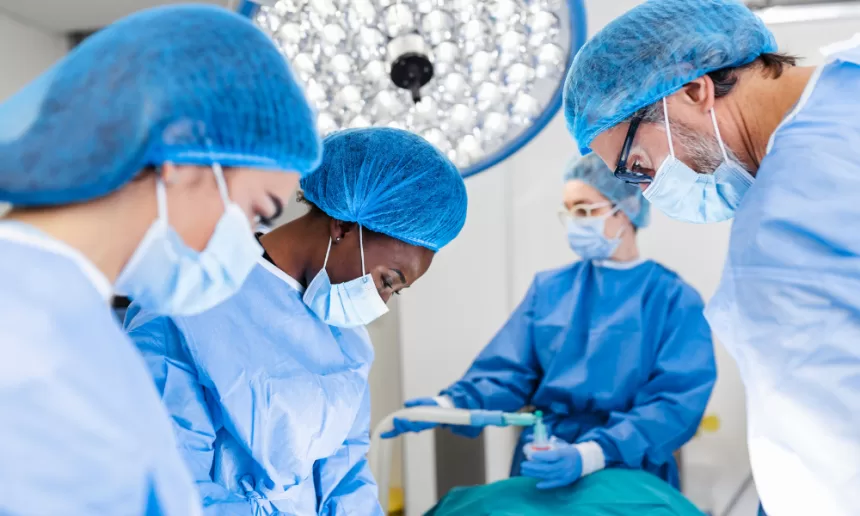Minimally Invasive Cardiac Surgery
Minimally invasive cardiac surgery is changing the landscape of heart disease treatment. It is characterized by mini-incisions, sophisticated technologies and a faster recovery than conventional open-heart surgery. The technique has revolutionized treatments for patients with cardiac conditions by providing a more comfortable alternative with faster times to recovery.
Introduction
Cardiac surgery is usually limited to long, invasive resection and recovery. However, advancements in medical technology have made minimally invasive cardiac surgery a viable option for many patients. This kind of operation enables cardiac surgeons to perform necessary interventions in smaller incisions, minimizing the amount of overall trauma and the time of being sick. In this article, we will discuss what Small-incision heart surgery is, why it is required, different types of procedures, their risks and benefits, etc.
What is Minimally Invasive Cardiac Surgery?
Minimally invasive cardiac surgery refers to heart surgeries performed using small incisions (usually between 2 to 4 inches) rather than the large cuts required in traditional open-heart surgery. Such procedures employ sophisticated instruments such as robotic arms, endoscopes, and miniaturization cameras to enable access/repair of the heart.
Surgeons widely perform coronary artery bypass grafting (CABG), valve repairs, and heart transplantations as some of the minimally invasive procedures. The goal is to reduce the damage caused by large incisions, minimize scarring, and reduce the risk of infection.
Why is Minimally Invasive Cardiac Surgery Needed?
Benign and malignant cardiac arrhythmias can lead patients to avoid traditional heart surgery with its long recovery times and high risk, therefore, minimally invasive surgery is often the preferred option. It’s particularly beneficial for:
- Elderly patients: Who may have a higher risk during open surgery.
- Patients with other medical conditions: Minimally invasive procedures place less stress on the body, making them ideal for those with diabetes or obesity.
- Younger, healthier patients: Who prefer faster recovery and minimal scarring.
Not only is this technique safer, but it also results in the patient with a higher quality of life after surgery with reduced pain and a lower number of postoperative hospital stays.
Types of Minimally Invasive Cardiac Surgery
Small-incision heart surgery can be divided into different kinds according to what is done in the procedure. Some of the most common ones include:
- Coronary Artery Bypass Grafting (CABG)
Cardiac bypass surgery (CABG) is carried out to circumvent blocked arterials in the heart. Surgeons entering the myocardium through small incisions can access the heart and graft clean blood vessels to bypass occluded arteries and thereby enhance coronary circulation to the myocardium.
- Valve Repair or Replacement
This procedure is used to treat damaged heart valves. Instead of opening the chest fully, surgeons can use a small incision to repair or replace the valve, restoring normal heart function.
- Atrial Septal Defect (ASD) Closure
An ASD is a defect in the septum dividing the two upper chambers of the heart. Minimally invasive surgery has the advantage of repairing the opening by a small incision, preferably by a catheter.
- Robotic-Assisted Heart Surgery
With robotic arms, the surgeon can perform very precise operations, resulting in smaller incisions, shorter healing time, and improved bleeding control.
Procedure Steps
The following constitute the steps involved in Minimally invasive heart surgery.
- Pre-surgical evaluation: Patients are tested, for example, with blood tests, ECGs and imaging scans to evaluate cardiac function.
- Anesthesia: General anesthesia is given to keep the patient asleep for the surgery.
- Incision and access: The surgeon has several incisions and also has specialized instruments such as cameras and robotic arms to enter the heart.
- Surgical procedure: It is repaired or bypassed according to the nature of the problem.
- Post-surgery care: Following the procedure, the patient is transferred to a recovery room for observation. Hospital stays are generally shorter compared to open-heart surgery.
Benefits of Minimally Invasive Cardiac Surgery
The benefits of minimally invasive cardiac surgery are extensive:
- Smaller incisions: The consequence of this is fewer scars and a more pleasing aesthetic result.
- Reduced recovery time: Patients recover to normal activity much faster than with conventional surgery.
- Lower risk of infection: Smaller incisions reduce the chances of infections and complications.
- Less pain: With less trauma from small incisions, there is less follow-up pain and distress.
- Shorter hospital stay: Patients may be discharged after 3-5 days postoperatively.
Risks and Complications
Although minimally invasive heart surgery is associated with less risk than conventional surgery, complications such as:.
- Infection: Any surgery carries the risk of infection.
- Bleeding: Despite the small incisions, bleeding can occur during or after surgery.
- Anesthesia complications: While rare, anesthesia can sometimes cause adverse reactions.
- Cardiac complications: There” is a low risk that postoperative heart rate disturbances may occur.
Cost of Treatment in India Compared with the USA.
The cost of Small-incision heart surgery can vary depending on the complexity of the procedure and the hospital’s location. On average:
- In India: The cost ranges from $5,000 to $15,000, depending on the type of surgery and the hospital.
- In the USA: The cost is considerably higher, ranging from $30,000 to $80,000 for the same procedures.
This significant price difference makes India a preferred destination for medical tourism, as patients can save a substantial amount without compromising on quality.
Best Hospitals in India for Minimally Invasive Cardiac Surgery.
India hosts several world-class hospitals that focus on Minimally invasive heart surgery. Some of the top hospitals include:
- All India Institute of Medical Sciences (AIIMS), New Delhi
- Fortis Escorts Heart Institute, New Delhi
- Medanta The Medicity, Gurgaon
- Max Super Specialty Hospital, Delhi
- Apollo Hospitals, Chennai
These hospitals employ highly trained cardiac surgeons with top-of-the-line facilities for performing minimally invasive procedures.
For More Information, Contact Us
For more information on Minimally Invasive Cardiac Surgery or to book an appointment, contact us at:
WhatsApp: +91-97181 19119
Email: info@worldhealthupdate.com



